Too sick to go to work?
Allergies are one of the top reasons adults skip work, according to James Sublett, MD, an allergist in Lousiville, Kentucky, and a past president of the American College of Allergy, Asthma & Immunology (ACAAI). One reason may be that allergies can lead to poor sleep. “Many allergy patients have sleep-disordered breathing due to nasal stuffiness and congestion—but may not even be aware of it,” says Clifford Bassett, MD, an allergist, an assistant clinical professor of medicine at NYU, and author of The New Allergy Solution. “You could get the same number of hours of sleep as usual, but wake up feeling less rested.” The first key to feeling better at work, then, is to control nasal symptoms so you can sleep better. (Check out the reasons you have chronic nasal congestion.) “Patients who do this report more productivity and less drowsiness,” Dr. Bassett says. Here’s some more guidance to curb your allergy symptoms while your work.

Tidy up your desk
Indoor allergies like dust can cause allergies and exacerbate symptoms of seasonal ones, says Leo Galland, MD, an integrative medicine doctor in New York City and author of The Allergy Solution. Keep your doors and windows closed, particularly on days with a high pollen count; keep your work surface free of dust; and take your lunch break indoors, Dr. Galland says. In addition, consider leaving your coat and shoes outside your office door to minimize the amount of environmental allergens you bring in. (Here are tricks to get rid of dust in your house.)
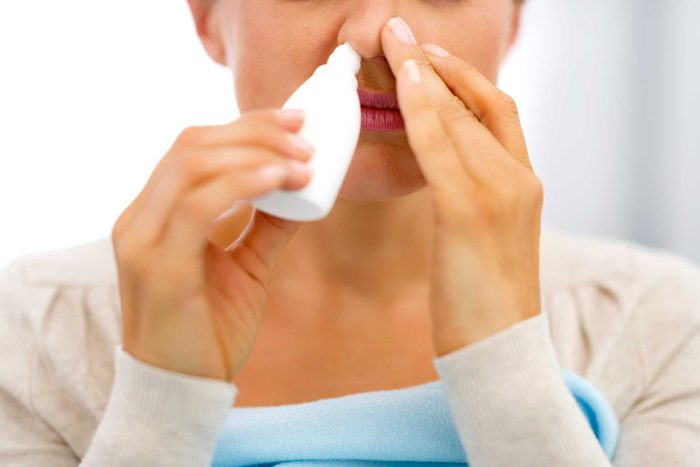
Stow saline spray in your desk
A non-medicated saline nasal spray is a quick and non-addictive way to remove allergens in your nose, Dr. Galland says. For more severe symptoms, try an over-the-counter medicated allergy nasal spray or talk to your doctor about a steroid nasal spray. In its updated 2017 guidelines, the Joint Task Force (a coalition from the American Academy of Allergy, Asthma & Immunology and the American College of Allergy, Asthma, and Immunology) recommends a nasal steroid spray for quelling tough allergy symptoms. Check out the 7 best allergy nasal sprays that doctors recommend.
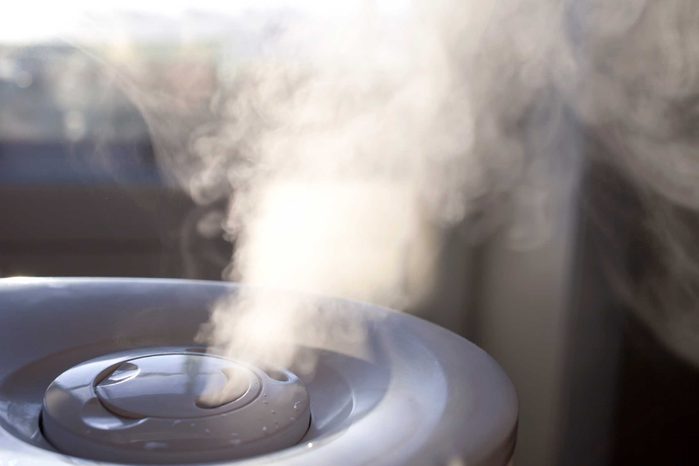
Invest in an air purifier
If you have your own enclosed space and your symptoms seem to get worse at work, invest in a small HEPA air purifier to remove pollen and other allergens from the air, Dr. Galland says. It’s not a cure-all but a HEPA air filter can help reduce some airborne allergens according to the ACAAI. Check out these allergist-approved air purifiers for every budget.

Make wise fashion choices
Anything you can do to minimize your exposure during the day can go a long way to making you feel better. One surprising trick? Avoid hair gel, as it attracts pollen, says Dr. Bassett. He also recommends donning big sunglasses to keep allergens out of your eyes, washing clothing with an anti-allergy laundry detergent, keeping your hair covered with a hat or scarf, and applying a petrolatum-based ointment (like Vaseline) near your nostrils a few times a day to block pollen from entering your nose.
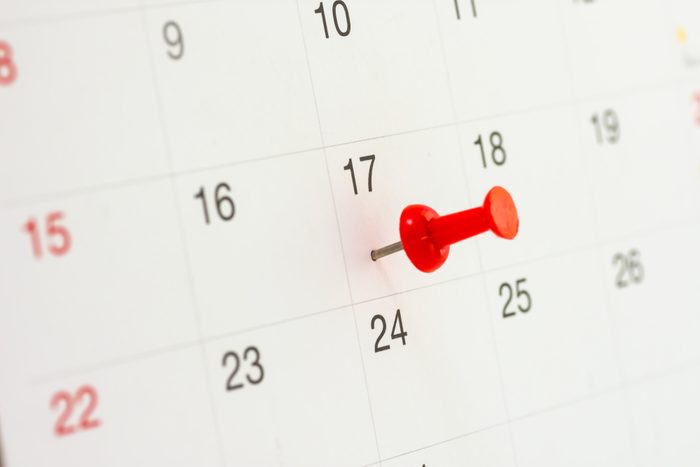
Schedule meetings around the pollen count
People who have seasonal allergies should make a habit out of checking the National Allergy Map each morning to see the pollen count in their area, says Dr. Bassett. If you have the flexibility, use this information to schedule important out-of-the-office meetings or any outdoor activities when pollen counts are the lowest. Pollen levels tend to be lower at the end of the day. Planning ahead can go a long way in reducing or preventing symptoms, he says.

Be careful on your commute
It’s not just your office you need to think about, your car can be an allergy hotspot too. For your commute, make sure you drive with the windows up and have your car’s air conditioner set to “do not recirculate,” recommends Dr. Bassett. If you have the option, park your car somewhere covered where it’s less likely to be exposed to pollen. In addition, check for potential allergens like air fresheners—even “natural” fragrances can cause symptoms in some people, he says. Learn if a car air purifier can help keep your space trigger-free.

Take your meds consistently
Allergy medications aren’t meant to be used only when symptoms get really bad, rather they work best when used consistently, says Dr. Basset. He recommends beginning allergy medication up to two weeks prior to the beginning of the season, so it will already be in your system when the allergens hit the air. He puts his patients on an “allergy alert”; your doctor can inform you more specifically about when you should start. (Try these tricks to keep your summer sneeze-free.)
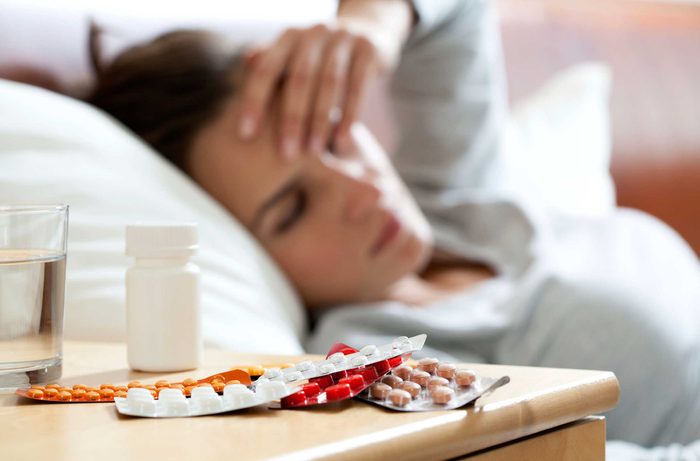
Watch what you take the night before
Many patients don’t realize that a sleep-inducing antihistamine like Benadryl at night can lead to hangover-like symptoms in the morning, Dr. Galland says. This can make you feel drowsy, foggy, dizzy, or otherwise impaired at work. If this is your issue, try non-drowsy antihistamines like Claritin, Zyrtec, and Allegra. (These are the drugs that the Federal Aviation Administration allows pilots to use, notes Dr. Bassett.) If these aren’t doing the trick, ask your doctor about a steroid nasal spray, which specifically targets congestion.

Clue in your co-workers
If you’re a seasonal mess, let colleagues and clients know. Depending on your allergy symptoms, people could mistakenly think you’re contagious, which could be especially damaging in careers like human resources or sales. Dr. Bassett shared the outrageous story of a patient with bad eye allergy symptoms—red, watery, puffy—who was interviewing for a new job. At one meeting, a prospective boss advised her to “get off the drugs” because of her appearance. (Check out these beauty and makeup tips to conceal allergy symptoms.)
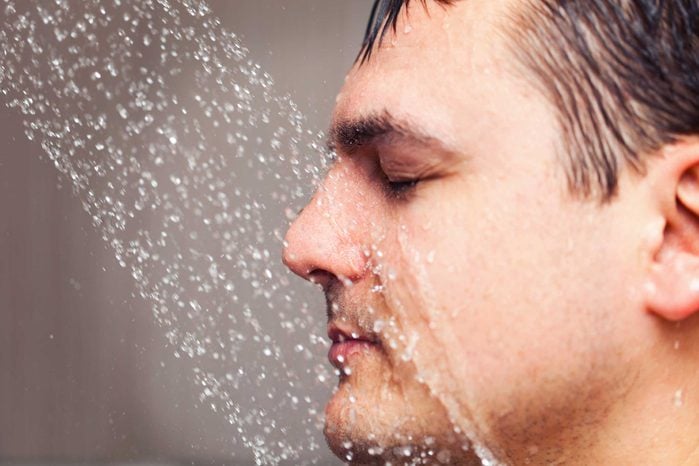
End your day right
A good night’s sleep is key to having a good morning at work, Dr. Sublett says. Avoid dragging pollen into your home, and especially your bedroom. Leave your shoes outside or at least near the door, and change out of your clothes immediately. Shower and wash your hair before bed. Use hypoallergenic mattress cover, pillowcase, and bedding in addition to regular laundering with an anti-allergy detergent. Lastly, keep the windows closed and a HEPA air filter running while you sleep.